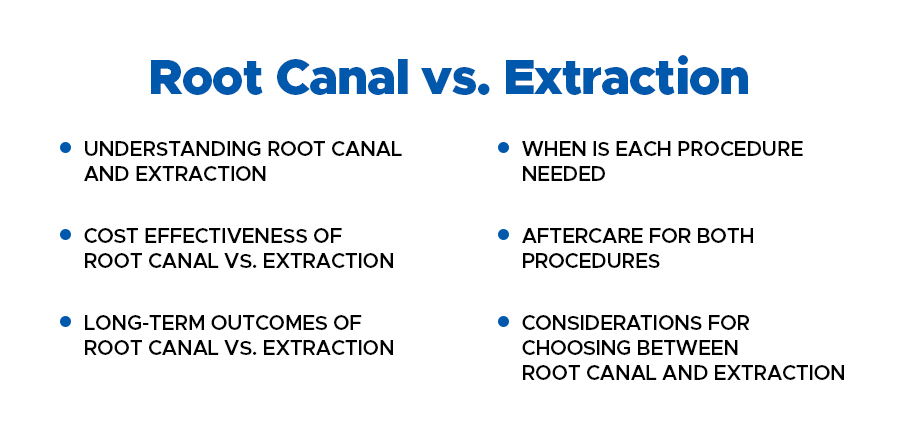Delhi Address:
36-A, Pocket 2, Sector 6, Behind Sector 6 Market, Dwarka, Delhi
Gurugram Address:
R2 136 M3M 65th Avenue Sector 65, Golf course extension road. Gurgaon Haryana 122101

Maintaining good dental health is not only beneficial for your smile but also enhances your overall well-being. Dental issues such as severe tooth decay or infection can cause discomfort and impact your quality of life. When facing these problems, two common treatments are often considered: root canal treatment and tooth extraction. Each option serves different purposes and outcomes. Understanding the differences and benefits of each can help you make an informed decision about the best course of action for your dental health.

Root Canal: A root canal treatment is a dental procedure that aims to save a tooth that has been severely infected or decayed. During the procedure, the dentist removes the pulp inside the tooth, cleans the root canal, and seals it to prevent further infection. This option is ideal for preserving the natural tooth and avoiding extraction.
Extraction: Tooth extraction involves the complete removal of a tooth from its socket. This can be necessary for various reasons, including severe decay, infection, or crowding. Extraction might also be required if a tooth is too damaged or decayed to be saved by a root canal.
Root Canal: This treatment is usually recommended when the tooth's pulp is infected, but the damage is not extensive enough to require removal. It is preferred when the tooth can be saved, as it helps maintain the natural alignment and integrity of your jaw and teeth.
Extraction: Extraction is often the last option but is necessary when the tooth is beyond repair, such as when decay has compromised the majority of the tooth or if severe gum disease has affected the supporting tissues and bone structures.
The cost of each procedure can vary based on location, the severity of the issue, and the dentist's expertise. Generally, a root canal treatment in Delhi is more expensive than an extraction due to its complexity and the materials used. But, it is important to consider long-term costs. Saving a tooth with a root canal might eliminate the need for more costly dental prosthetics, like bridges or implants, which are mainly required after an extraction to replace the missing tooth.
Post-procedure care is essential for both root canals and extractions to ensure healing and prevent complications.
Extraction Aftercare: Post-extraction, managing the risk of infection is important. Patients must follow the dentist's instructions on how to care for the empty socket, including avoiding rinsing vigorously, not smoking, and eating soft foods. Pain management may be necessary, and attention is needed to ensure a blood clot forms in the socket to aid healing.
Preservation of Natural Teeth with Root Canal: Opting for a root canal treatment helps preserve the natural tooth structure. By saving the tooth, a root canal maintains the natural alignment and function of your jaw and other teeth, which is beneficial for chewing and oral health overall. Keeping your natural tooth also helps prevent the teeth adjacent to the gap from shifting, which could lead to misalignment and other dental issues down the road.
Consequences of Extraction: While extraction can quickly resolve issues like pain and infection, it also leads to the loss of the tooth. This loss can have several long-term consequences. Adjacent teeth may shift into the space left by the extracted tooth, leading to misalignment. Additionally, tooth loss can lead to bone loss in the jaw over time, as the bone that once supported the tooth begins to atrophy from lack of use. This can change the shape of your face and lead to further dental problems.
Impact on Oral Health: It is important to consider how each procedure impacts your overall oral health. A root canal is generally better for maintaining oral health because it keeps the tooth in place and prevents other teeth from moving, which can cause bite issues and difficulty eating. An extraction, although simpler, might require additional procedures like dental implants or bridges to fill the space and prevent further complications.
Understanding both options is important when deciding between a root canal and extraction. If you are looking for the best root canal treatment near me, you are at the right place. At Vital Dental Care, we provide comprehensive evaluations to determine the best treatment plan customised to your needs. Our clinic is equipped with advanced technology and staffed by experienced dental professionals dedicated to providing the best root canal treatment Dwarka. Trust Vital Dental Care to help you make the right choice for your dental health, ensuring a pain-free and healthy smile for years to come
Q.Is a root canal treatment painful?
Ans.Modern root canal treatments are performed with effective anaesthesia, making the procedure comfortable. Most patients experience minimal discomfort during and after the procedure.
Q.How long does it take to recover from a tooth extraction?
Ans. Recovery from a tooth extraction typically takes a few days. It is important to follow your dentist's aftercare instructions to ensure proper healing and avoid complications.
Q. What are the signs that I might need a root canal?Ans. Signs that you may need a root canal include severe toothache, prolonged sensitivity to hot or cold, swelling and tenderness in the nearby gums, and tooth discolouration.
Q.Can I replace an extracted tooth?
Ans.Yes, there are several options for replacing an extracted tooth, including dental implants, bridges, and dentures. Your dentist can recommend the best option based on your specific needs and oral health.

